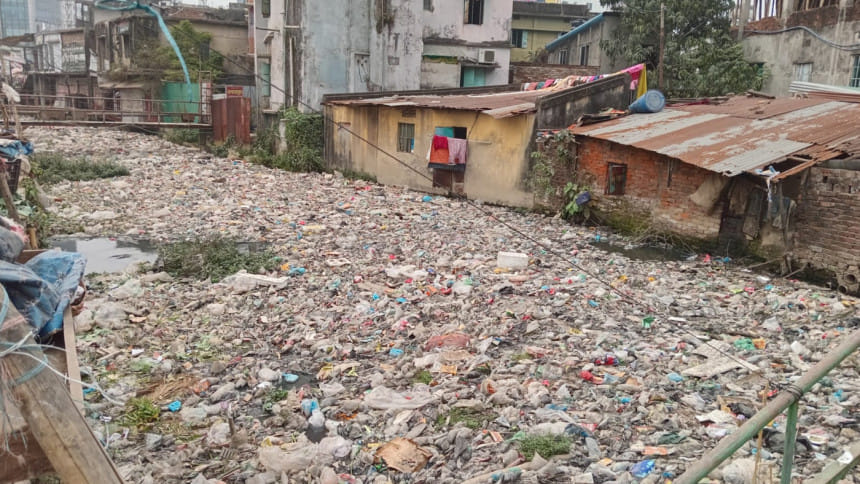Plastic pollution choking Ctg canals

With most canals in Chattogram city choking on non-biodegradable plastic waste, waterlogging is likely to worsen in the coming monsoon, fear experts.
To ensure rainwater is drained off easily, the waterbodies need to be excavated immediately. Regular monitoring is also necessary to stop indiscriminate dumping of single-use plastic and polythene round the clock, they recommended.
During a recent visit to Chaktai Khal in the city's Chawkbazar KB Aman Ali Road, this correspondent saw the surface of the canal covered with floating plastic and polythene bags. Workers were seen excavating the canal under a mega project initiated by Chattogram Development Authority to address waterlogging.
A similar scenario was witnessed in Birza, Jamal Khan and Rajakhali canals.
Due to a blatant lack of civic awareness and absence of proper dustbins, the city's residents often throw household garbage in nearby canals and drains. Poor waste management by the Chattogram City Corporation further adds to the menace.
"The situation would not have been so dire if people had not dumped non- biodegradable waste into Chaktai canal for years. The authorities concerned hardly take any steps to prevent it," said Fazlur Rahman of Phultala area.
Unplanned discharge of untreated and non-biodegradable waste into waterbodies not only harms its ecosystem but also leads to waterlogging, mosquito breeding, and air pollution for locals, said Prof Dr Swapan Kumar Palit of civil engineering department at CUET. He stressed the need for tough legal action to save the waterbodies.
The city produces around 3,000 tonnes of wastes daily, 249 tonnes (8.3 percent) of which are non-biodegradable in nature, according to a study conducted by CUET's civil engineering department in 2022.
However, the CCC can collect and safely dispose only 109 tonnes of plastic and polythene wastes daily, while the rest 140 tonnes remain uncollected. This clogs canals and drains and hinder their waterflow, especially during monsoon, the study revealed.
Reducing use of plastic products and enhancing the CCC's waste management capacities are necessary to improve the situation, mentioned Prof Swapan, the study's supervisor.
According to Mandatory Jute Packaging Act-2010 and Mandatory Jute Packaging Rules-2013, it is mandatory to use jute products for packaging of essential items, including paddy, rice, wheat, maize, fertiliser, sugar, ginger, garlic, onion, potato, fish feed, poultry feed, flour, chillies, lentils and rice bran. However, implementation of the laws are hardy seen in market, he said.
"Around 90 percent carry-bags used in grocery shops and kitchen markets are made of plastic and polythene," he said. He suggested awareness-raising initiatives and mobile courts to enforce the laws.
According to local sources, most of port city's 37 canals are badly affected by these non-perishable wastes, which eventually flow into the Karnaphuli river during monsoon, polluting it too.
Citing a 2019 BUET study, Chattogram Port Authority sources said the Karnaphuli riverbed is covered in 2-7-metre thick plastic layers in different areas which hampered the river's dredging work during that time.
"CCC workers do not clean canals regularly. So, plastic wastes keep piling up in Chaktai canal round the year," said Sadhan Das, a local.
Refuting the allegations, Morshedul Alam Chowdhury, deputy chief conservancy officer of CCC, said the workers regularly clean up the canal, but the situation does not improve as locals and traders at make-shift kitchen markets in Chawkbazar Dhunir Pool to Phultala continue to dump waste into canals at nights.
Abul Bashar Mohammad Fakhruzzaman, deputy commissioner of Chattogram, said, "Due to important engagements, including the national polls, we could not conduct mobile courts till January. The drives have resumed."

 For all latest news, follow The Daily Star's Google News channel.
For all latest news, follow The Daily Star's Google News channel. 



Comments